
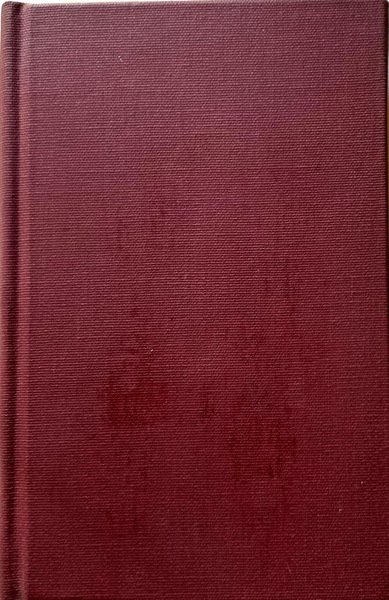
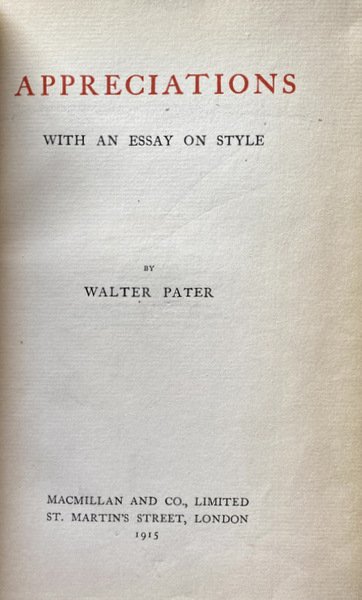
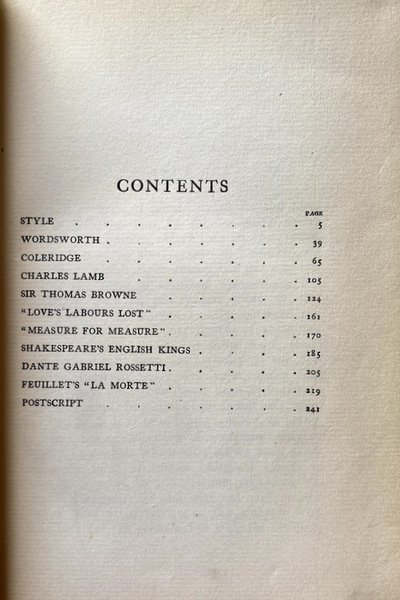
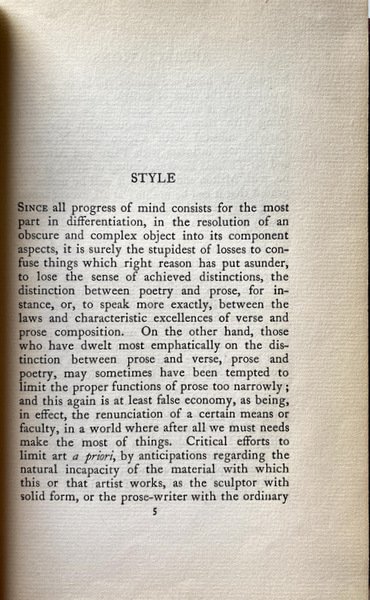
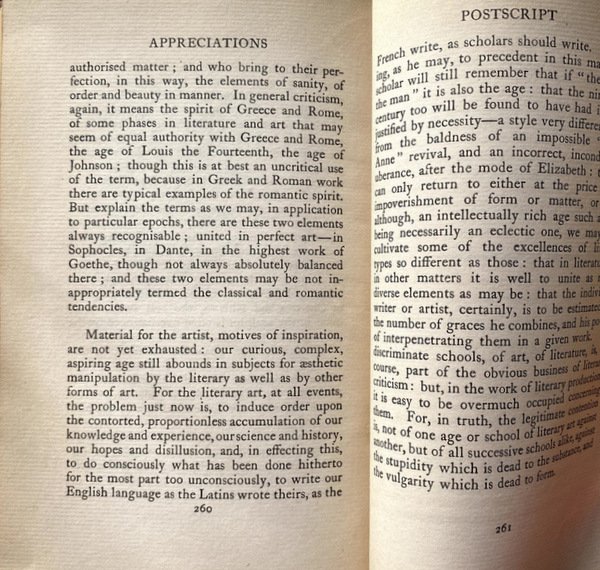
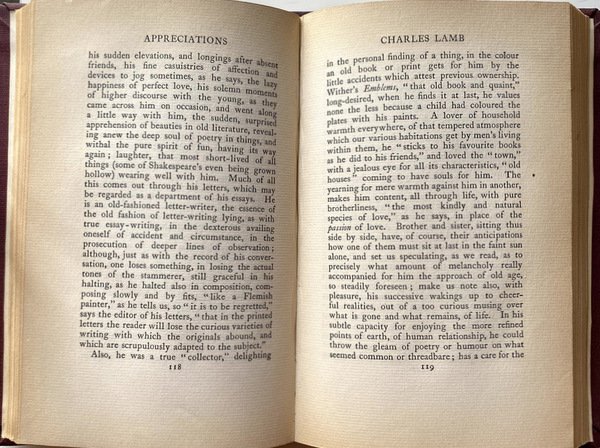
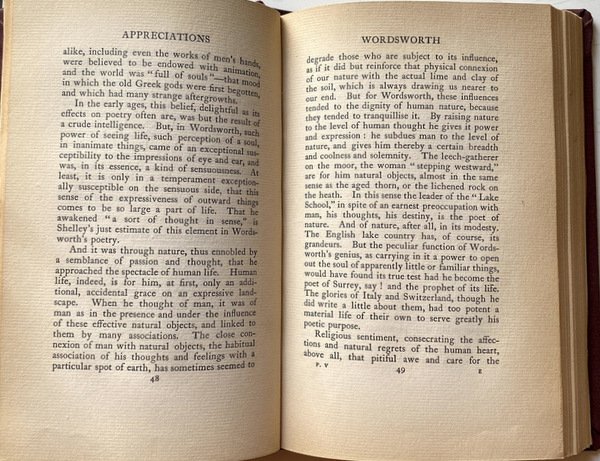
Livres anciens et modernes
Walter Pater
APPRECIATIONS WITH AN ESSAY ON STYLE
MACMILLAN AND CO., 1915
26,99 €
Studio Maglione Maria Luisa
(Napoli, Italie)
Les frais d'expédition corrects sont calculés une fois que l'adresse de livraison a été indiquée lors de la création de la commande. Un ou plusieurs modes de livraison sont disponibles à la discrétion du vendeur : standard, express, economy, in store pick-up.
Conditions d'expédition de la Librairie:
Pour les articles dont le prix est supérieur à 300 euros, il est possible de demander un plan de paiement échelonné à Maremagnum. Le paiement peut être effectué avec Carta del Docente, Carta della cultura giovani e del merito, Public Administration.
Les délais de livraison sont estimés en fonction du temps d'expédition de la librairie et de la livraison par le transporteur. En cas de retenue douanière, des retards de livraison peuvent survenir. Les frais de douane éventuels sont à la charge du destinataire.
Pour plus d'informationsMode de Paiement
- PayPal
- Carte bancaire
- Virement bancaire
-
-
Découvrez comment utiliser
votre Carta del Docente -
Découvrez comment utiliser
votre Carta della cultura giovani e del merito
Détails
Description
Book Excerpt: recounted, a story to be told, will often be in its second reading. And though there are instances of great writers who have been no artists, an unconscious tact sometimes directing work in which we may detect, very pleasurably, many of the effects of conscious art, yet one of the greatest pleasures of really good prose literature is in the critical tracing out of that conscious artistic structure, and the pervading sense of it as we read. Yet of poetic literature too; for, in truth, the kind of constructive intelligence here supposed is one of the forms of the imagination.That is the special function of mind, in style. Mind and soul: -hard to ascertain philosophically, the distinction is real enough practically, for they often interfere, are sometimes in conflict, with each other. Blake, in the last century, is an instance of preponderating soul, embarrassed, at a loss, in an era of preponderating mind. As a quality of style, at all events, soul is a fact, in certain writers- the way they have of absorbing language, of attracting it into the peculiar spirit they are of, with a subtlety which makes the actual result seem like some inexplicable inspiration. By mind, the literary artist reaches us, through static and objective indications of design in his work, legible to all. By soul, he reaches us, somewhat capriciously perhaps, one and not another, through vagrant sympathy and a kind of immediate contact. Mind we cannot Read More.
Walter Pater (August4, 1839) was an English essayist, critic and writer of fiction. He attended Queen's College, Oxford. His earliest work, an essay on Samuel Taylor Coleridge, appeared in 1866 in The Westminster Review; Pater soon became a regular contributor to a number of serious reviews, especially The Fortnightly, which published his essays on Leonardo da Vinci, Pico Della Mirandola, Botticelli, and the poetry of Michelangelo. All were included in his first, and perhaps most influential, book, Studies in the History of the Renaissance (1873; reissued as The Renaissance, 1877). In 1885 Pater's only novel, Marius the Epicurean, appeared. Ostensibly, Marius is a historical novel, set in the time of Marcus Aurelius and tracing the philosophical development of its young protagonist and his gradual approach to Christianity. Practically, however, Marius is more a meditation of the philosophical choices that confronted Pater, or any thinker, during the late Victorian period. In light of the work's underrealized characterizations and the lack of any but intellectual action, it is difficult to justify calling it a novel in the usual sense of the term. Yet, as a highly polished prose piece, and as an argument for an austere yet intensely experienced way of life, it holds a singular place in Victorian literature. On July 30, 1894 Pater died suddenly in his Oxford home of heart failure brought on by rheumatic fever, at the age of 54. He was buried at Holywell Cemetery, Oxford.
Walter Pater (Shadwell, Londra, 1839, Oxford 1894) saggista inglese. Si laureò a Oxford, dove nel 1864 divenne fellow del Brasenose College e dove passò la maggior parte della sua tranquilla esistenza. I contatti con i preraffaelliti gli diedero modo di approfondire il suo interesse per l'arte e per la letteratura. Ricordiamo fra le sue opere più significative: Mario l'epicureo (Marius the epicurean, 1885), Ritratti immaginari (Imaginary portraits, 1887), Apprezzamenti (Appreciations, 1889), Platone e il platonismo (Plato and platonism, 1893), Il fanciullo in casa (The child in the house, 1894). P. è famoso come esponente e portavoce del movimento dell'«arte per l'arte», sviluppatosi in Inghilterra negli ultimi decenni del sec. XIX. La conclusione del suo studio su Il rinascimento (The renaissance, 1873), secondo il quale il valore dell'arte si misura soprattutto dall’intensità delle sensazioni che essa trasmette, divenne una sorta di manifesto del nuovo edonismo anti Vittoriano; e la prosa elegante delle sue opere, ritmata da delicate sfumature, influenzò un’intera generazione di intellettuali, ansiosi di sottrarsi al moralismo imperante nella critica artistica e letteraria.
Contents: Style. Wordsworth. Coleridge. Charles Lamb. Sir Thomas Browne. Love's labours lost. Measure for measure. Shakespeare's English kings. Dante Gabriel Rossetti. Feuillet's La morte. Postscript. Subjects; English literature History and criticism. Literary style.
Descrizione bibliografica
Titolo/Title: Appreciations: with an essay on style
Autore/Author: Walter Horatio Pater (1839-1894)
Editore/Publisher: Londra/London: Macmillan and co., limited, 1915
Lunghezza: 274 pagine; 22 cm
Rilegatura/Binding: Cartonato/Hardcover
ISBN: 9780554311432
Lingua/Language: Inglese/English
Collana: Volume 5 di Library edition of the works of Walter Pater
Soggetti: Style, Literary criticism, English literature, History, Miscellaneous cultural studies, The Blessed Damozel, Florence, of Beatrice, Love's Nocturn, The Stream's Secret, Ballads and Sonnets, The King's Tragedy, Troy Town, Sister Helen, Eden Bower, Nineveh, The Renaissance, Art, Poetry, Selected Essays, Blank Verse, Poems, Greece, Rome, Tragedy, Sophocles, Greek and roman works, Ulysses, Measure for Measure, Cassandra, The Garden of Cyrus, Hydriotaphia, House Beautiful, Tombless Epitaph, Samuel Taylor Coleridge, Edward III, Richard II Henry IV, Richard III, Plays, Richards, Edwards, Henrys, Throne, Usurpation, William Shakespeare, Chronicle, Drama, Civilization, Aesthetic movement, John Keats, Drammaturgia, Collezionismo, Libri Vintage Fuori catalogo, Libri in Inglese, Da collezione, Rarità, Narrativa, prosa, Poesia, Poetica, Stili letterari, Cultura anglosassone, Scrittori britannici del XIX secolo, Filosofia, Re, Teatro, Rinascimento, Versi, Rime, Ritmo, Stile, Metrica, Preraffaelliti, Goethe, William Blake, Edgar Allan Poe, Simbolismo, Elizabeth Siddal, Stile Letterario, Critica letteraria, Letteratura inglese, Storia, Studi culturali vari, Firenze, Dolce Stil Novo, Ballate, Sonetti, Tragedia, Mitologia greca, Poetica, Saggi, Poesie, Grecia, Roma, Tragedie, Sofocle, Opere greche e romane, Ulisse, Misura, Il giardino di Ciro, Epitaffio senza tomba, Edoardo, Riccardo, Enrico IV, Estetica, Dramaturgy, Collectibles, Discontinued Books, Books in English, Collectible, Rarity, Fiction, Prose, Poetry, Poetics, Literary Styles, Anglo-Saxon Culture, 19th Century British Writers, Philosophy, Kings, Theater, Renaissance, Verses, Rhymes, Metric, Pre-Raphaelites, Symbolism
Parole e frasi comuni
actual ancient artist beauty Browne century character characteristic charm classical Coleridge colour comes common complete criticism curiosity death delicate distinction effect element English experience expression fact fancy feeling figure flowers force gift hand human idea imaginative impression influence instance intellectual interest kind king language least less letters light literary literature living manner matter means Measure mind moral motive nature objects observation once passing passion perfect philosophy piece play poem poetic poetry present prose reader reading refined religion romantic sense sentiment soul spirit story strange style sweet temper term things thought touch true truth unity various verse whole Wordsworth writings

